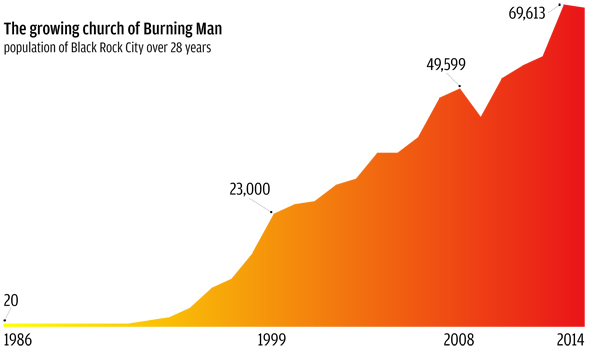This summer will be Jenny Kane’s first trip to Burning Man. No surprise—last year, six out of 10 attendees were new visitors to the experimental city that rises each summer in Nevada’s arid Black Rock Desert. The difference with Kane is that she’ll be going as the Reno Gazette-Journal’s first full-time, year-round Burning Man reporter.
The new beat is both a product of the restructuring of newsrooms at Gannett-owned papers and a reflection of how the annual event two hours outside Reno has reshaped the cultural landscape of the surrounding area.
Having covered Native American territory in New Mexico for The Daily Times and crime in the Caribbean at The Virgin Islands Daily News, Burning Man attendees—‘Burners’—will be another cultural group to cover for the Reno native.
“I’m interested in fringe cultures in general, so that’s the biggest draw,” said Kane, who started the new role on Monday.
The tribe grows annually. Black Rock City, as the site is called, had 66,000 visitors last year, up from 36,000 a decade ago. Attendees have included Diddy, Jeff Bezos, and even The Simpsons, and spin-off ‘burns’ can be found as far afield as South Africa and New Zealand. At the movement’s core are 10 principles that regulate the community, including a gift economy, “radical self-expression” and an order to leave no physical trace behind when the city packs up.

While websites like Burners.me and Burn After Reading pitch themselves to burners, and mainstream publications like The Atlantic unpack the phenomenon for national audiences, the Gazette-Journal is focused on the questions this wandering city leaves for Reno.
“It’s part of our community that we aren’t currently connecting with. And we haven’t covered it in the way that we probably should have. It matters to our economy and it’s part of our culture,” said Kelly Scott, the Gazette-Journal’s executive editor (who has been to Burning Man “a couple of times.”) “The overarching focus question of this beat is: How does Burning Man connect to northern Nevada, and what does it mean for here?”
The beat involves both arts and watchdog coverage, said Scott. Burning Man transitioned from being an LLC to a nonprofit last year, and scrutinizing its finances matters when pre-sale tickets have gone up to a cool $800. Previous coverage has looked at the culture clash between burners and local Native American communities, and another aim will be to draw the connections between Burning Man and the local art museums and tech community. “People credit Burning Man with the development of a creative class in Reno,” said Scott.
The Gazette-Journal is betting on enough Burning Man issues to last year-round, though current media coverage of the phenomenon tends to begin and end with the week of the event. Mainstream publications also tend to focus on Burning Man’s more outlandish tendencies—usually involving liberal drug use, nudity, and EDM—with mild bafflement and gentle derision. More often than not, they are first person narratives.
Yet Black Rock City has the infrastructure that any other city would, and so has stories to tell about its hospital, airport, DMV (Department of Mutant Vehicles) and urban planning.
“You’re creating a city for a week, in the desert, with people from all over the world,” said Katrina Raenell, the last reporter at the Gazette-Journal to cover Burning Man as part of the arts beat. “Once you get there, there’s no money. People lose their materialistic self, lose their identity, and try to mesh in a different sort of world while surviving the elements. It creates a human camaraderie unlike any other place probably in the world.”
At heart, Burning Man is about an experimental culture—a utopia, for some—and the consequences, both good and bad, which flow from it. Reporting should involve the arts, infrastructure, and investigations, but ultimately the traditional beat that’s closest in comparison is perhaps religion.
Chris Ip is a CJR Delacorte Fellow. Follow him on Twitter at @chrisiptw.
